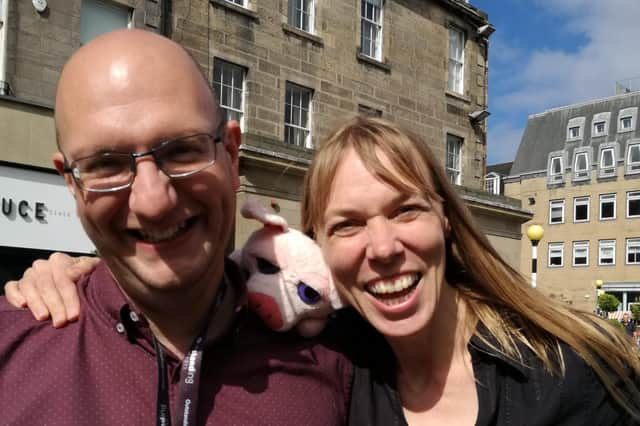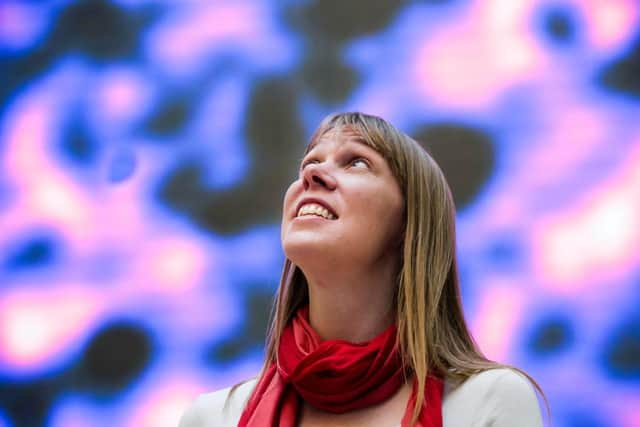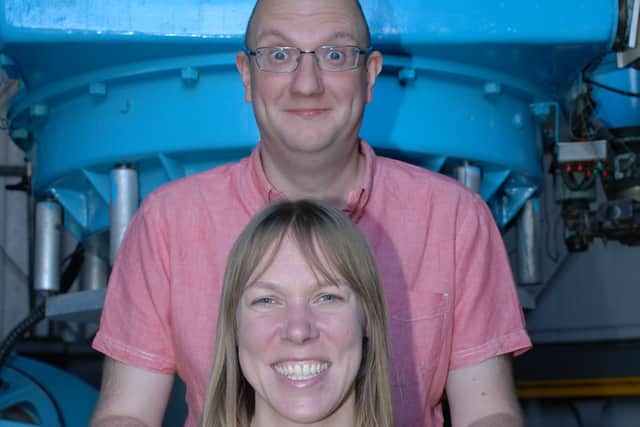Double stars: The comedy duo finding the funny in astrophysics


Two astronomers are having an argument about dark matter maps. “Joe’s map is bigger than my map, but my map is better,” says Catherine Heymans. “My map is five times bigger than Catherine’s map,” clarifies Joe Zuntz. “Yes but it’s not about the size, Joe,” quips Heymans.
Heymans considers this for a moment. “Joe’s map is prettier,” she acknowledges. “We did a comedy show once where Joe decided to change the script half way through, and got his map printed out in a massive picture frame and hid it. He said, ‘right everyone this is Catherine’s map’; he’d printed mine on A4 paper and crumpled it up so it looked really rubbish. Then he said ‘and here’s my map’ and walked round the back of the stage and came back with this massive map. It threw me off and I forgot the script.”
Advertisement
Hide AdHeymans and Zuntz are friends, comedy partners, and astrophysics colleagues at the University of Edinburgh. Heymans is a Professor of Observational Cosmology (“it means I observe the Universe, which I think is a cool professional title”) while Joe is a Reader in Cosmology, “which is lower than a professor, as Catherine is fond of reminding me”.


Heymans’ public profile rose significantly in 2021 when she became the new Astronomer Royal for Scotland, the first woman appointed to a role established almost 200 years ago. Before that, she was probably best known as lead author on KiDS, (Kilo-Degree Survey), a seven-year international study using telescopes at the European Southern Observatory in Chile, which resulted in the most detailed picture yet of dark matter. This is where the maps come in.
“There’s five times as much dark matter in the Universe as the stuff you can see,” explains Heymans. “When you look at these maps of dark matter it’s like you can put on spectacles to see it. It’s amazing that we’ve come so far. You used to have these computer simulations but with the techniques Joe and I have been working on, and massive telescopes, we can now map out where all this invisible dark matter is. It’s quite amazing because it looks just like the computer simulation said it would look.”
This, you might think, is challenging material to turn into comedy, but Heymans and Zuntz have been doing it for four years now, after an impromptu performance at an astronomy conference evolved into a full show as part of the Edinburgh Fringe’s Cabaret of Dangerous Ideas. “It’s where they get academics to be funny,” explains Heymans. “Joe of course was naturally funny already; I had to skip some of the training sessions because I was busy doing real science. The long and the short of it is that I explain the science…” “… And I occasionally chip in with sarcastic remarks,” responds Zuntz.
Thinking up a “dangerous idea” was tricky. “It’s very hard to be controversial in astronomy,” notes Zuntz. The one they opted for became the show’s original title, You Don’t Matter, “the idea that the Universe is so immense that there's really no way in which you can say a person matters at all”. That show has now evolved into The Universe: Does Anything Matter, which will make its debut next month on the opening night of the Hebridean Dark Skies Festival, Scotland’s annual arts and astronomy programme.


For the Astronomer Royal in particular, doing a comedy show is part of a broader mission to make astronomy more accessible to the general public. In Zuntz she has found a kindred spirit who shares her irreverent approach to the subject. For evidence, listen to the Dark Skies Festival’s latest podcast, in which Heymans and Zuntz spend as much time gleefully bickering as they do discussing astrophysics, especially when I raise the subject of Heymans’ new role.
Advertisement
Hide Ad“I think there’s an upper limit to the number of times a day one should say the phrase ‘Astronomer Royal’, and I think you’re four or five times higher than that number,’” teases Zuntz. “Joe doesn’t like talking about it,” Heymans shoots back, “because it just accentuates the difference in our status.” Asked what the appointment says about diversity in the world of astronomy, Heymans immediately suggests that Zuntz, as a middle aged white male, should be the one to answer the question. As it happens, he has a thoughtful response, pointing out that limiting the range of people who can become scientists limits the effectiveness of science.
“In science we talk a lot about systematic errors, errors that trick you into thinking you're doing something right when actually you're doing something wrong,” he says. “It’s very hard to detect and you can absolutely write down a very clear and simple statement of how you're being unbiased and careful and it can just be wrong.” Heymans agrees: “There are so many different ways to solve problems and it’s so great working with different kinds of people because they come up with ideas that you would never have thought of and you get to the solution by a much faster route.”
Advertisement
Hide AdMuch of Heymans and Zuntz’s work involves mapping the universe via “giant collaborations” with astronomers all across the world. “For the first time in the history of humanity really, we are mapping a sizable fraction of the whole universe,” marvels Zuntz. Lockdown has presented both challenges and opportunities for the astronomy world. On the plus side there are more amateur astronomers than ever, as travel-deprived adventurers began exploring the night sky instead; however some of the world’s largest telescopes have been closed, being too far from hospitals for Covid comfort; most of Heymans and Zuntz’s work now takes place online. “There are people I’ve been working with for two years now that I’ve never met,” laments Zuntz.
Both, then, are looking forward to meeting the public again – and to performing their show on Lewis, home to some of the darkest skies in Britain. “In astronomy the amateur astronomers know much more than we do about lots of things,” says Zuntz. “If you asked us ‘what’s that light in the sky?’ we might have no idea; we’re extragalactic astronomers, but amateur astronomers know lots more than we do about the night sky.”
The Hebridean Dark Skies Festival opens on 11 February, with events at An Lanntair and across the Isle of Lewis. Find out more, and listen to the festival’s podcast, at www.lanntair.com/darkskies. The podcast is also available via Spotify, Apple and other streaming services.
A message from the Editor:
Thank you for reading this article. We're more reliant on your support than ever as the shift in consumer habits brought about by coronavirus impacts our advertisers.
If you haven't already, please consider supporting our trusted, fact-checked journalism by taking out a digital subscription at https://www.scotsman.com/subscriptions